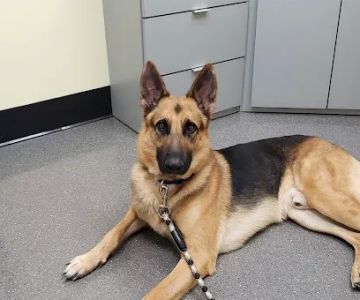What Education is Needed to Become a Veterinarian? A Detailed Guide
- 1. Overview of Veterinary Education: What to Expect
- 2. Prerequisite Education Before Veterinary School
- 3. What You’ll Learn in Veterinary School
- 4. Time Commitment: How Long Does It Take to Become a Veterinarian?
- 5. Challenges and Rewards of Pursuing a Veterinary Degree
- 6. Career Opportunities After Becoming a Veterinarian
Becoming a veterinarian is a rewarding career choice for animal lovers, but it’s also one that requires years of dedicated education and training. If you're wondering, “What education is needed to become a veterinarian?” you’ve come to the right place. The journey to becoming a vet is demanding, and it involves a significant time investment and a broad array of academic coursework. In this guide, we will walk you through the various educational requirements, what you’ll learn along the way, and the time commitment required to become a veterinarian.
The road to becoming a veterinarian is more than just a passion for animals—it requires academic excellence, hands-on experience, and a love for science and medicine. While many people aspire to work with animals, the process of becoming a veterinarian is not for the faint of heart. But with the right dedication and planning, you can navigate the path to a fulfilling career in veterinary medicine. Let’s take a closer look at what it takes to become a veterinarian.
1. Overview of Veterinary Education: What to Expect
Veterinary education is a multi-step process that requires years of hard work and dedication. It’s not just about animal care; becoming a veterinarian involves studying complex subjects such as biology, anatomy, pharmacology, and surgery. Veterinary school, like medical school, is competitive, and the admissions process is rigorous. It’s a field where you must be prepared for both the intellectual challenges and the emotional demands that come with working with animals in a medical context.
The first step towards becoming a veterinarian is completing a bachelor’s degree, typically with a focus on a science-related field. After that, aspiring veterinarians must apply to a veterinary school to earn a Doctor of Veterinary Medicine (DVM) degree. Veterinary school itself typically takes four years, and it covers both theoretical knowledge and practical, hands-on experience working with animals in clinical settings.
As with medical school, the academic path to becoming a veterinarian can be intense, with long hours spent in lecture halls, laboratories, and animal clinics. During veterinary school, students not only learn about the health and treatment of various animals but also gain practical experience through clinical rotations and internships. These experiences are vital for developing the skills needed to care for animals in real-world scenarios.
2. Prerequisite Education Before Veterinary School
Before attending veterinary school, students must first complete an undergraduate degree. While some schools offer specific programs designed for aspiring veterinarians, such as pre-veterinary programs, the majority of veterinary students complete a bachelor’s degree in fields like biology, animal science, or chemistry. The foundation of these programs is critical because they provide the core scientific knowledge required for veterinary school.
In addition to the general coursework in subjects like biology, chemistry, and physics, students must complete specific prerequisites that are required by veterinary schools. These courses typically include organic chemistry, microbiology, biochemistry, and animal biology. Some schools may also require experience working with animals in a clinical or research setting as part of the application process. This hands-on experience is essential because it allows prospective veterinarians to gain valuable insight into the day-to-day responsibilities of animal care.
Many veterinary schools also expect applicants to have gained substantial practical experience, either through volunteer work, internships, or part-time jobs at animal shelters, veterinary clinics, or farms. This experience not only helps applicants stand out but also ensures that they have a true understanding of the responsibilities of being a veterinarian.
3. What You’ll Learn in Veterinary School
Once you’ve completed the necessary prerequisites and have been accepted into veterinary school, you will embark on a comprehensive program that combines classroom learning with clinical experience. Veterinary school is divided into two main phases: the first phase focuses on foundational medical sciences, while the second phase emphasizes clinical skills and hands-on treatment of animals.
During the first two years of veterinary school, students study subjects like anatomy, physiology, immunology, pharmacology, pathology, and microbiology. This academic training is vital for understanding the complex systems of animal bodies and the diseases that affect them. Additionally, students take courses that focus on the ethics and legal aspects of veterinary medicine, as well as animal welfare and behavior.
In the last two years of veterinary school, students begin their clinical rotations, where they work with actual animals under the supervision of experienced veterinarians. These rotations allow students to apply their classroom knowledge in real-world scenarios, gaining practical experience in diagnosing and treating illnesses, performing surgeries, and caring for animals in various settings, including private clinics, animal hospitals, and research labs.
4. Time Commitment: How Long Does It Take to Become a Veterinarian?
Becoming a veterinarian is a time-intensive process. It typically takes around eight years to complete the necessary education: four years for a bachelor’s degree and four years for a DVM program. Some students may choose to pursue internships or specialty training after veterinary school, which can add another year or more to the total time commitment.
During this time, students must balance demanding coursework with clinical rotations, which can involve long hours and significant emotional and physical exertion. The rigorous schedule often requires significant dedication and sacrifice, but for those who are passionate about animal care, the effort is well worth it. Additionally, many veterinarians choose to continue their education even after graduation, pursuing certifications in specialized fields such as surgery, dermatology, or cardiology, which can take an additional three to five years of training.
5. Challenges and Rewards of Pursuing a Veterinary Degree
As with any profession, there are both challenges and rewards associated with becoming a veterinarian. One of the biggest challenges is the intense workload during veterinary school, which requires students to manage a heavy academic load while gaining hands-on experience. Veterinary students often work long hours, sometimes sacrificing personal time, to complete assignments, study for exams, and participate in clinical rotations.
Another challenge is the emotional toll that working with animals can take. While veterinarians are trained to handle a wide range of medical issues, they are also tasked with making difficult decisions regarding the treatment and care of animals, including end-of-life decisions. These emotional challenges can be draining, but they are an inherent part of the profession.
Despite these challenges, the rewards of becoming a veterinarian are immense. Veterinarians have the opportunity to make a real difference in the lives of animals and their owners. The satisfaction of diagnosing a complex medical condition, performing a successful surgery, or simply providing comfort to a sick animal is deeply fulfilling. Additionally, veterinarians enjoy job stability and the potential for a lucrative career, especially if they specialize in certain areas of veterinary medicine.
6. Career Opportunities After Becoming a Veterinarian
After completing their education, veterinarians have a wide range of career options available to them. Many veterinarians choose to work in private practice, where they treat pets, livestock, or exotic animals. Others may choose to work in animal hospitals, research labs, zoos, or universities, focusing on areas like surgery, wildlife conservation, or public health.
Veterinarians who work in private practice often have the opportunity to build their own client base and develop a close relationship with their patients and their owners. This is one of the most fulfilling aspects of the profession. Additionally, there are opportunities for veterinarians to work in academia, conducting research on animal health or teaching the next generation of veterinarians.
For those who want to specialize in a certain area, the field of veterinary medicine offers various certifications and specialization options, such as cardiology, dermatology, oncology, or neurology. Specializing can lead to higher earnings and greater job satisfaction, as veterinarians can focus on the areas they are most passionate about.











